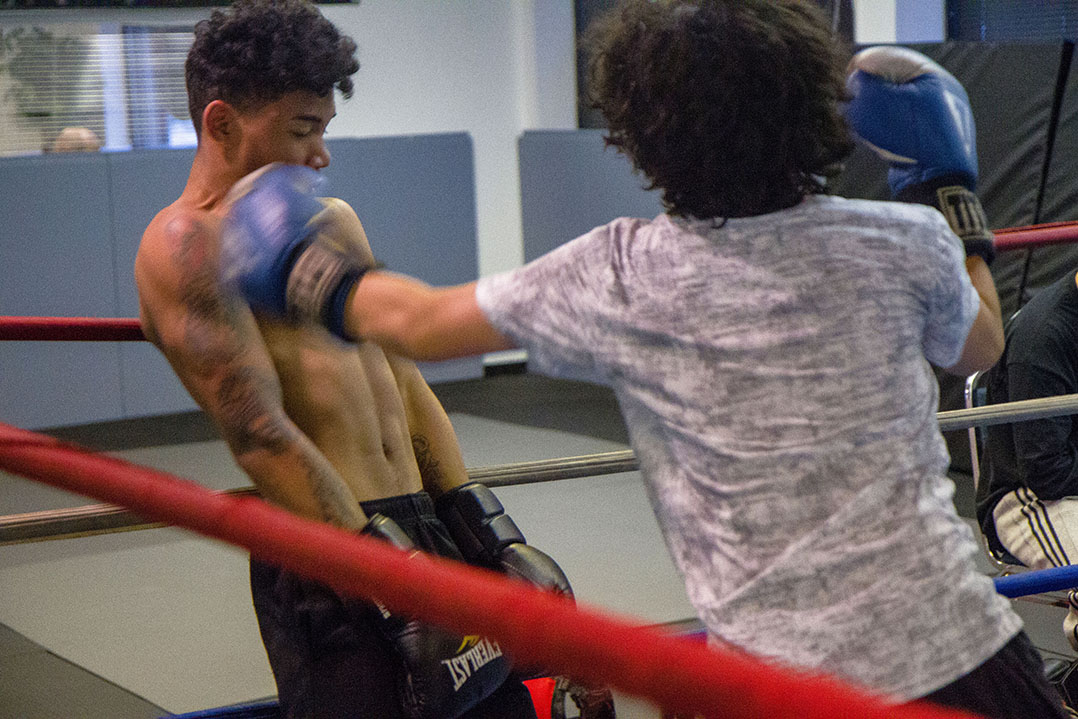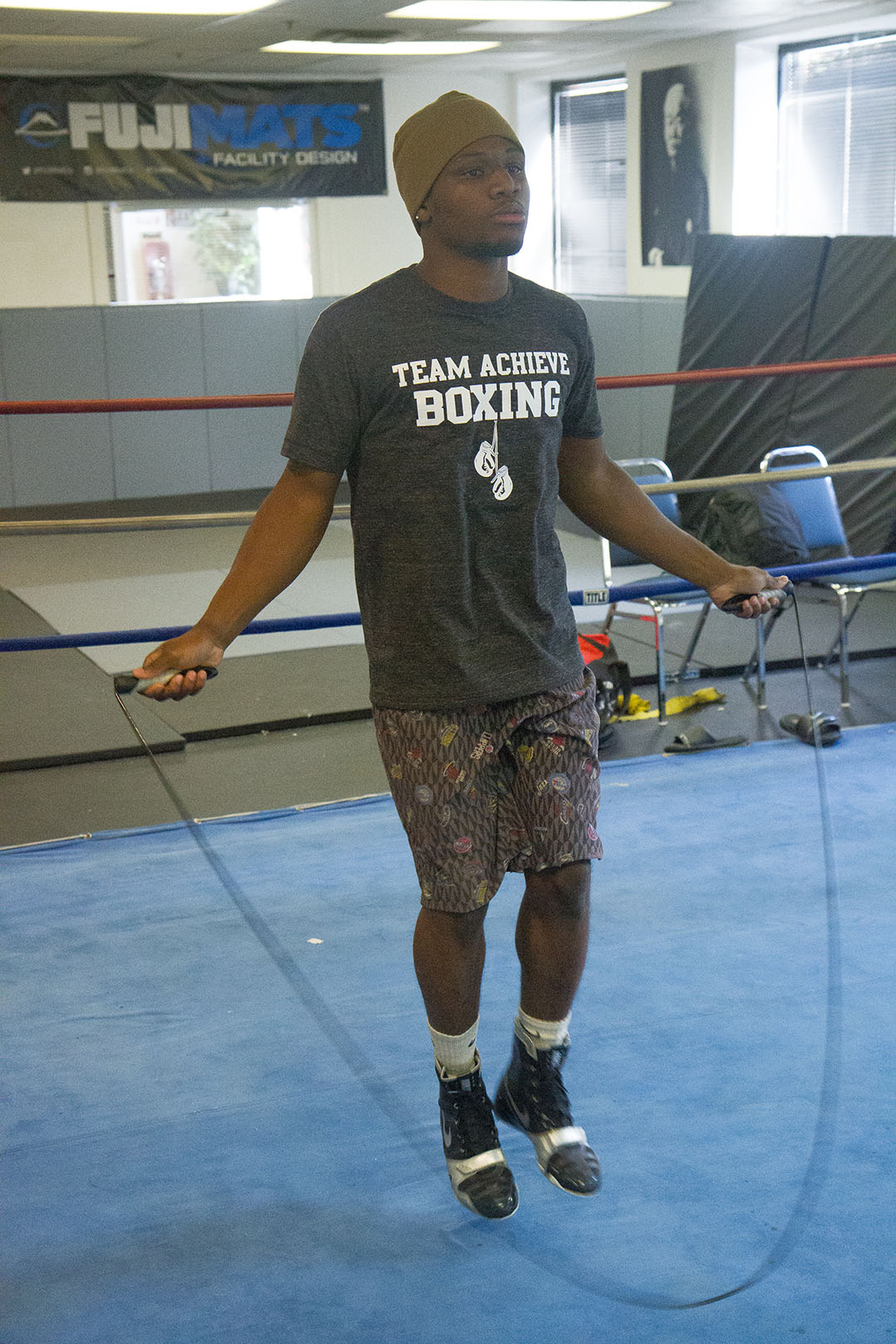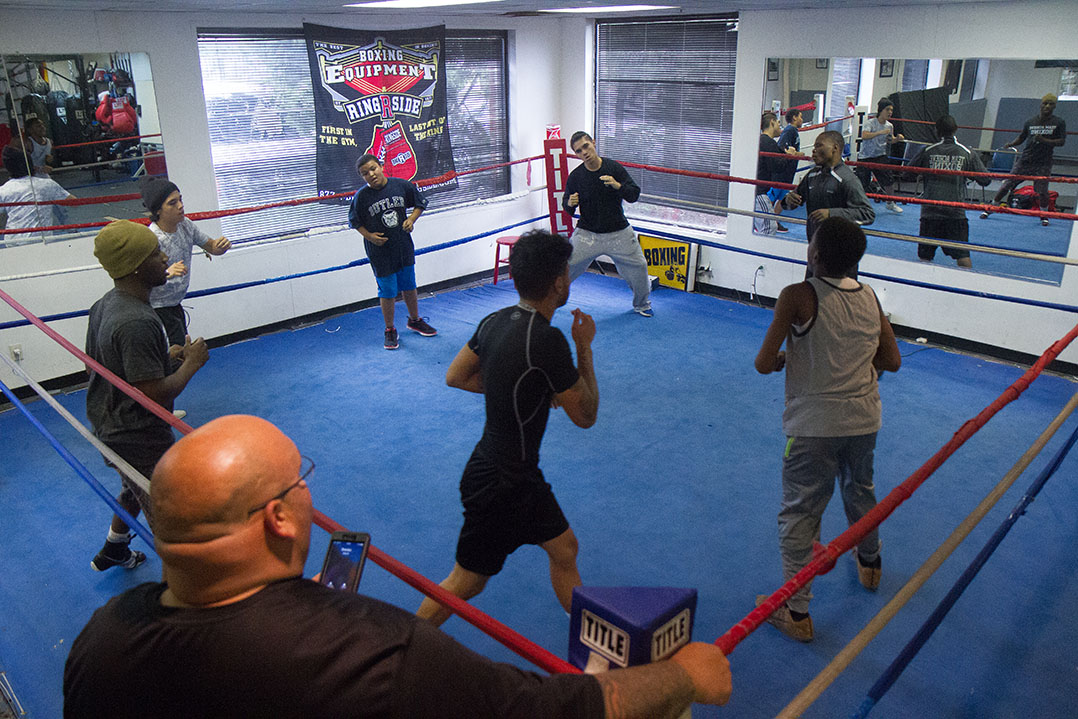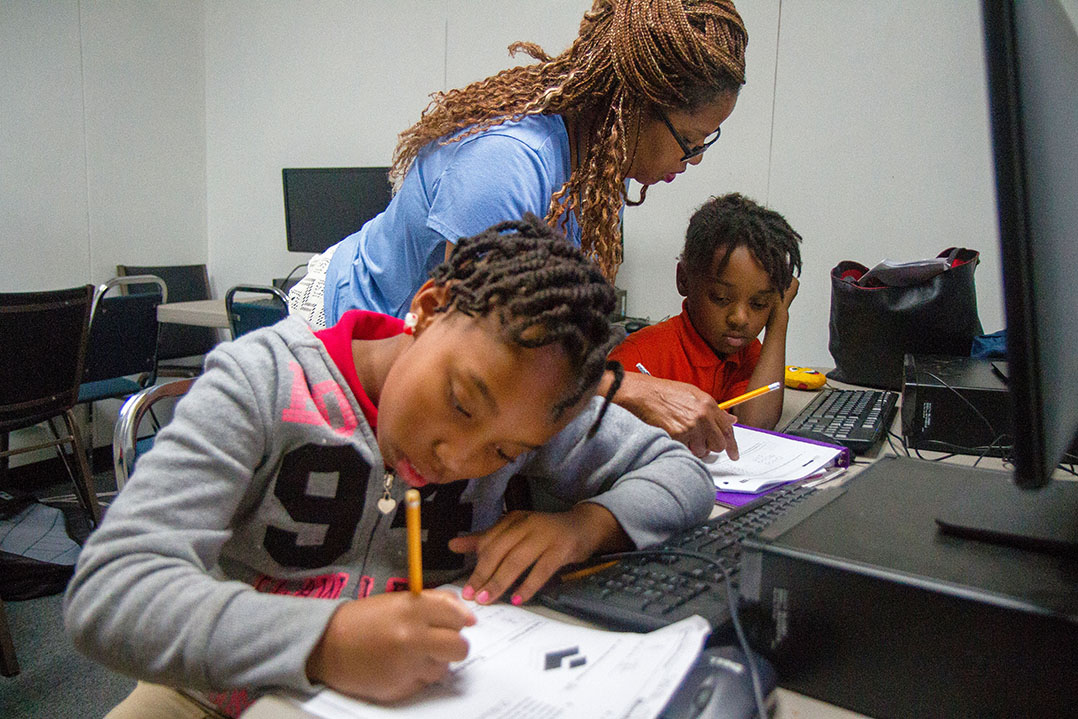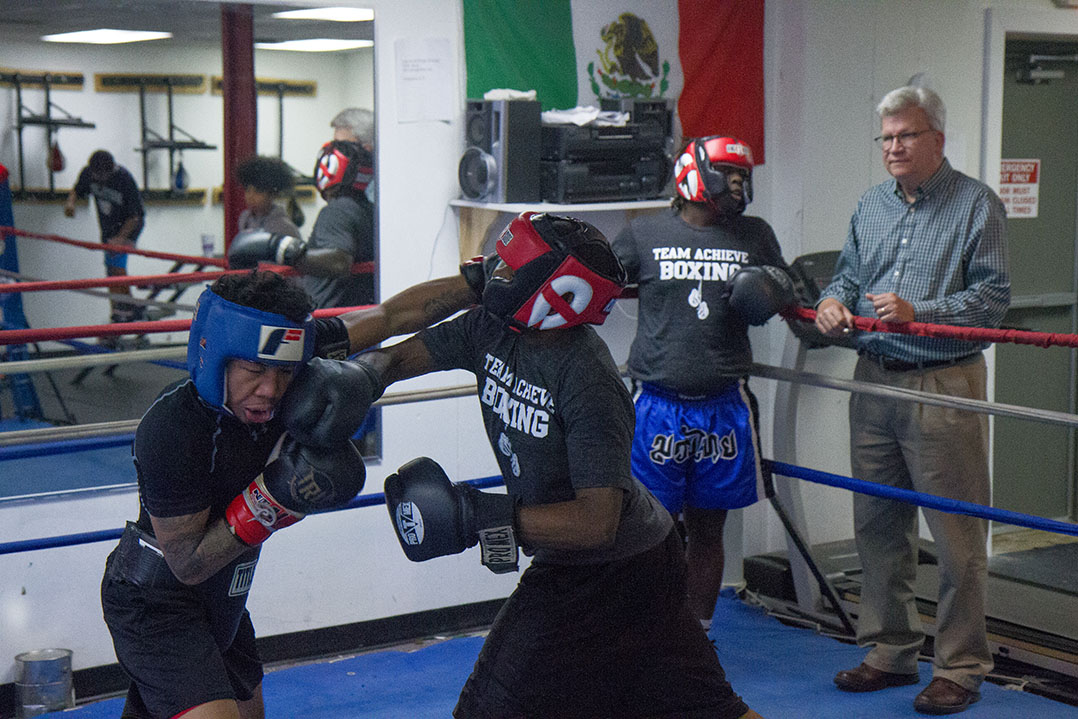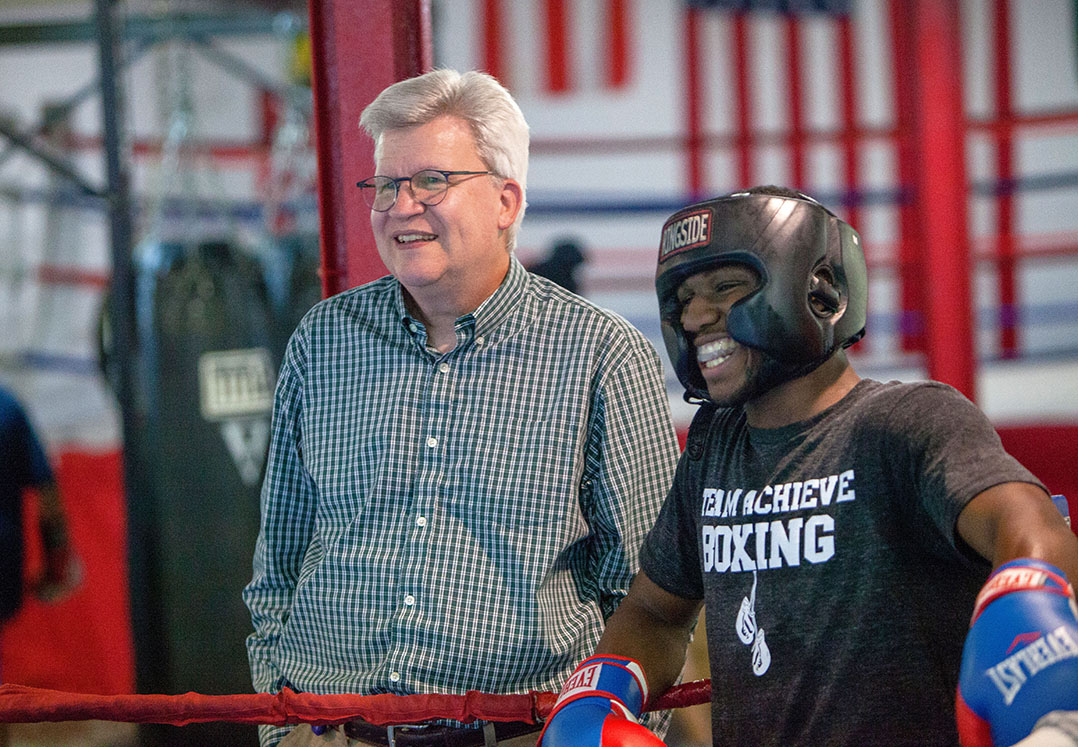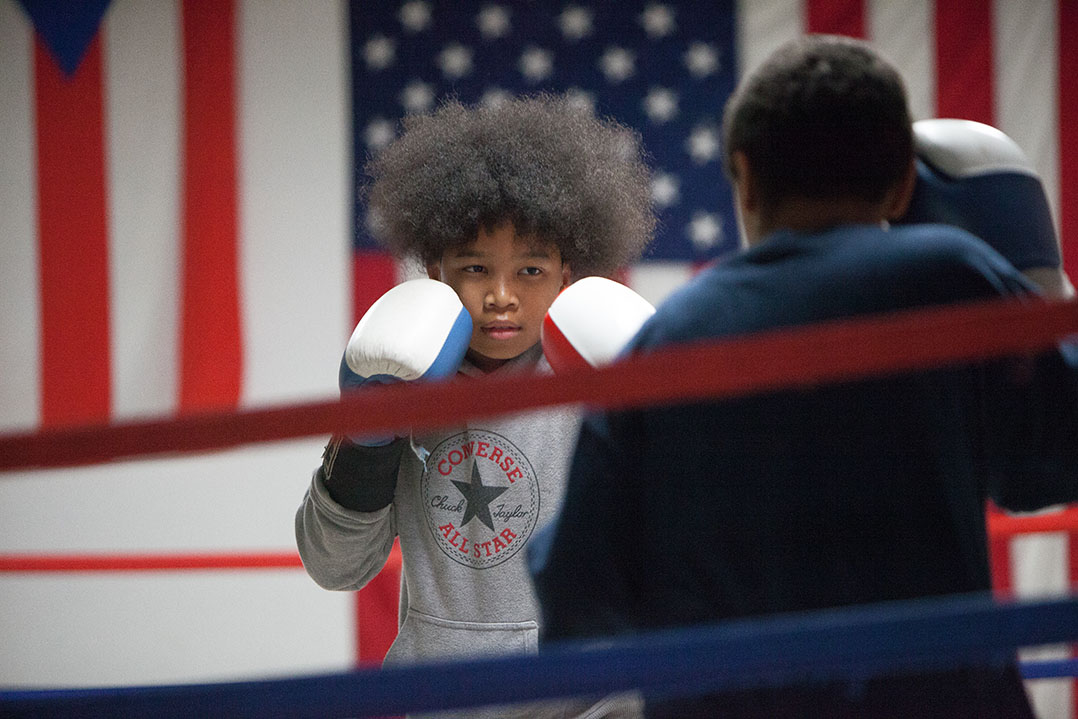Commentary by Brad Thompson
I should start by acknowledging my bias. I hate boxing. I grew up in an affluent Chicago suburb, and boxing, excuse me for saying this, seems a bit barbaric. The whole point of boxing is to hurt your opponent. Frankly, my wife and I didn’t let our sons play tackle football because of the risk of injury. We would never even have considered boxing.
So, I was a little bit skeptical when I heard about a ministry that teaches boxing to inner-city kids. My initial reaction was twofold: Isn’t that dangerous for the kids, and is it wise to teach kids who are struggling with anger how to fight better?
Well, putting my pride aside (which isn’t easy), after three hours with these kids, they completely turned me around.
I learned about this ministry by talking to my former pastor, Glenn McDonald, who for years led Zionsville Presbyterian Church. I wasn’t surprised that Glenn was involved in an inner-city ministry, but frankly I would’ve guessed it to be a study group covering the complete history of the minor prophets in the Old Testament and what made them minor, or perhaps chess. I would’ve never guessed boxing.
So why boxing? For one thing, it turns out it’s a bit difficult to recruit inner-city kids who are leading troubled lives to participate in competitive flower arranging. But is that it? Does the club exist solely because it appeals to the desire of inner city kids to fight?
This is where my education started.
I did not pull any punches with James Curles , executive director of Achieve, Inc., the boxing ministry. Just as the country is coming to grips with the concussion risk of football, it seems a bit incongruous for us to encourage kids to box . Mr. Curles was ready for the question.
He observed that, intuitively, you would think boxing is dangerous, but in reality it’s not so much. He cited the National Safety Council data that tracks and records sports injuries in the U.S. Of the 37 sports reflected in the 2011 report, in terms of number of injuries (those that required treatment in hospital emergency rooms), boxing was 26th on the list. That means there were 11 sports that could be considered safer than boxing (based solely on number of reported injuries). Among those that reported fewer injuries than boxing were racquetball, archery and billiards. Ranked higher on the list of more dangerous sports were bicycle riding, basketball and football. Even bowling, cheerleading and tennis reported more injuries than boxing.
I asked him to explain it to me, intuitively, and he pointed out that amateur boxing is very different from professional boxing. The rules are different, and the safety gear is different. Amateur boxing has much more padding in the gloves and requires headgear as well as other protective gear. More than that, the style of fighting is very different. Professional boxing, perhaps like professional wrestling, goes for particular styles that are good theater. Amateur boxing focuses more on scoring points through certain tactical but subtle maneuvers.
If boxing is no more dangerous than most other sports, the question is whether this qualifies as a ministry. And here’s where I went to school.
Let’s start by understanding the kids and the challenges the kids face. Out of the 512 students who participate in the Achieve program, 367 — or 72 — percent have been expelled or dropped out of school. Forty-three percent (219) were involved in the court system with one or more felonies. The area around the Achieve gym on 16th St. on the near east side of Indianapolis is one of the highest crime areas in the city. Many of the kids have been homeless and face extraordinary personal challenges.
E’mond (“Moo Moo”) Driver came to Achieve when he was 12 years old. He was expelled from school and facing a bleak future. At various times in his life, Driver and his family were homeless.
In trying to assess whether this program helps, we have to start with the fact that many of the kids who come to this program are angry and like to fight, and get into trouble for doing so. Does the program help them manage that anger?
There are at least four ways it does:
- Three hours of calisthenics and boxing a day is a terrific way to burn off excess energy.
- Punching a bag and, for that matter, a human probably has a tremendous cathartic effect for people who have anger to work through.
- Boxing teaches kids to modulate their anger. I didn’t appreciate this until I saw it. As you would guess, in boxing, your opponent might repeatedly punch you in the face. Most people would get angry at that. However, the coach repeatedly told his fighters not to get angry. There is so much strategy involved in boxing that anger is a sure way to lose. Anger means you lose focus on doing strategically what you need to do. So, the best fighters turn out to be those who can get punched in the face repeatedly and not get angry.
- There is an organic ethic – not taught by the coach –within boxers not to fight with anyone who is untrained. Of course, a trained boxer can knock the stuffing out of someone who hasn’t been trained. So, to get into such a fight would be viewed as a sign of weakness to fight with someone who isn’t worthy. This isn’t something the coach needs to teach. This is basic pride in action, in a good way.
But the program goes beyond helping manage anger. A few of the other benefits of the program include:
- Students who are a part of Team Achieve must maintain a minimum GPA of 2.5 and maintain good academic attendance and not partake in violence of any form.
- Good sportsmanship. Sounds trite, but I submit it’s actually much harder to be a good sport to a guy who just punched you in the face than it is in any other sport. But I saw these kids congratulate each other when their opponent would really deck them.
- All the other benefits of being in a sport, including learning focus and discipline. The program obviously also keeps the kids busy. And it becomes a club, where everyone has a sense of belonging, reducing the draw of gangs.
- Because the club spans a rather wide range of ages, they create an environment where the older have to pay it forward by teaching the younger. No kid pays to participate in this program. Instead, as they grow in skill, they are expected to pass it down to those who are younger. The program also creates an environment where older kids become role models for the younger kids. I watched as 7- and 8-year-old kids studied every move the teenagers made. And fortunately, those teenagers were moving in a positive direction. In this same vein, the program nurtures leadership.
- Many of the kids the program accepts have been expelled from school. Indeed, the schools make it plain that the students are not welcome back even though they are in the program. So, many of the students are enrolled in a program to recover credits from their high school, while others are taking full-time online classes. The facility has a computer lab with internet access where students access Khan Academy and PLATO Learning systems. PLATO Learning allows students to recover credits through their enrolled high school, even though they are not physically at the school.
- The program also succeeds at helping with family bonding, as several fathers hung out to watch the kids train.
And the data supports it. Of those who prior to joining Team Achieve had a criminal record, 96 percent (211) students have not had any new or additional charges. In comparison, the average recidivism rate for juveniles in Indiana is 33.4 percent. Nearly 70 percent of the Achieve Academy students graduated. That is essentially every kid who by age would be expected to graduate. The additional 158 or 31 percent are succeeding at their current grade level.
Achieve worked with Moo Moo Driver and his family to recover all of his credits and catch up to his grade level. Moo Moo recently graduated from Liberty Christian Academy, a private alternative school that provides non-traditional students a second chance to obtain a high school diploma. He now has a good paying job with UPS.
By the way, Moo Moo is a 12-time state champion with a record of 48-3. Last year, he competed at the national Golden Gloves competition for Team Indiana.
The program is extraordinarily accomplished, despite its small size. Although it may get anywhere from 20 to 70 kids on any given evening, the group that travels and competes is small by comparison to the clubs it competes against. But that doesn’t keep the kids from winning state championships. The club has trained more than 350 state champions to date, including champions in Indiana Silver Gloves, Indiana Junior Olympics and Indiana Golden Gloves.
The program gives these kids a chance to travel throughout the U.S. and internationally to compete. Funds are always tight, but they managed to go with at least a small group to a significant number of tournaments.
Glenn McDonald goes to see the kids when he can, but mostly he serves on the board of directors providing support wherever possible. From his position as director of mission integration for Ascension Health, he can guide volunteers to the ministry. But he also acts as the spiritual leader for the ministry, helping kids discern God’s path for them.
Many of these kids would go without dinner were it not for the program. Second Helpings typically supplies a dish, but on the evening I visited, Glenn McDonald also brought fried chicken for the team. It disappeared quickly. Protein is something they need.
As I was getting ready to leave, kids in the club started to come up to me one by one, not as a group, and very spontaneously and genuinely extended their hand to shake, and tell me politely how appreciative they were of me coming to watch them box. I was stunned by how mature and gracious these kids are, from the youngest to the oldest.
It turns out that boxing can help kids develop character, and literally dozens of traits that will help them throughout their lives. I was wrong (this one time), and I was grateful to be able to step out of my sheltered life to learn about another way of living.


